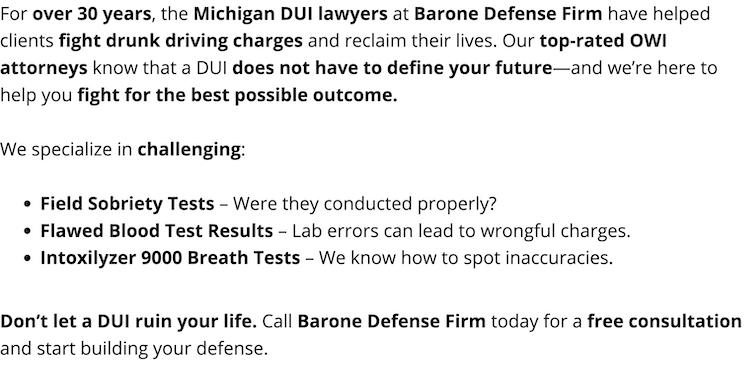DUI License Penalties & Suspension
Many people are unaware that your license can be automatically suspended by the state if you refuse to take a breathalyzer or if your blood alcohol content (BAC) is over the legal limit. This can happen before you ever step foot inside a courtroom. In fact, you have only 14 days from the date of your arrest to contest this license suspension.
To learn more about handling a license suspension or penalties, review the following pages:
Impact of OWI on Your License
If you have been arrested for a first-offense operating while intoxicated (OWI) charge, your license can be suspended for 30 days. After this suspension, you will have a restricted license for 150 days. If you are charged with first-offense high BAC (.17% or above), you could be looking at 45 days of no driving, followed by 320 days with a restricted license—but you must have an ignition interlock device installed to take advantage of this restricted privilege.
Penalties for Second Offense
For a second OWI offense within seven years, your license can be revoked for life. You do have the right to contest the revocation after one year. If your hearing is successful, your license will be restored, but you will be required to install an ignition interlock device in your vehicle. If you lose, you will have to wait a year to request another hearing.
Penalties for Third Offense
The license penalty for a third OWI offense depends on your record. If this is your third offense within 10 years, your license can be revoked for five years. If your license was revoked at least once within the past seven years, you will face a hard five-year revocation. However, if your license was not revoked within this time, you can apply for the reinstatement of your license after one year. If the license restoration hearing is unsuccessful, though, you will have to wait another full year before applying for reinstatement.
You should know that just because you are granted a license restoration hearing, it does not mean you will automatically get your license back. You must present clear and convincing evidence that you meet the eligibility requirements for license restoration in order to win your hearing.
License Plate Confiscation
In Michigan, if you are arrested for drunk driving and have prior convictions on your record, your license plate could be confiscated. In this situation, you will not be eligible to obtain a new license plate until the court case has been settled.
If you are arrested for drunk driving and have had one or more impaired/intoxicated driving offenses within the past seven years, or three within your lifetime, you may be subject to license plate confiscation. Impaired driving charges can include operating while intoxicated (OWI), operating with a presence of drugs /operating with a presence of a controlled substance (OWPD/OWPCS), or operating while visibly impaired (OWVI).
Additionally, prior convictions for any of the following offenses will be considered:
- Reckless driving causing serious injury or death
- Moving violation causing serious injury or death
- Negligent vehicular homicide, murder or manslaughter
If a law enforcement officer pulls you over for one of the above violations, he or she will run a record check through the Law Enforcement Information Network. This system will inform the officer of any prior convictions you have and, if necessary, instruct the officer to confiscate your license plate. The officer will issue you a temporary paper license plate in its place and enter this information into the system, and a hold will be placed on your file (or the file of the vehicle's owner.)
Once the case is completed, the court will issue you a form that you must take to a Secretary of State branch office in order to have the hold cleared.
What Are the Penalties for Driving on a Suspended or Revoked License in Michigan?
Specific penalties for driving with a suspended or revoked license in Michigan can vary, depending on the driver's previous violations and the severity of the crime. For example, penalties for a first violation may include prison terms of up to 93 days and/or fines up to $1,000.
Penalties for second violations can include up to 1 year in prison and/or fines up to $1,000. Drivers who cause accidents leading to injury or death of another party when operating a vehicle on a suspended license can face up to 15 years in prison and fines ranging from $2,500 to $10,000.
Driver's License Revocation
A license revocation involves a much lengthier and more complicated process. Revocation is typically reserved for repeat (habitual) offenders; for example, if you are convicted of two drunk driving charges within seven years, your license will be revoked for a minimum period of one year. If you had a prior revocation within the last seven years, the minimum revocation period is five years.
Revocation essentially means that your driving privilege has been completely terminated; in other words, a revocation puts you in the position you were in before you ever had a license. There is no "end" date for a revocation. You will only become eligible to reapply for a license once you have served the full term of the revocation, and you are not guaranteed to regain a license once you reapply.
Getting Your License Back
If your driver's license has been revoked, you will not be eligible to apply for reinstatement for one full year, and reinstatement is not guaranteed. The application process is lengthy and requires documented evidence and testimony that you are not a liability to the safety of other drivers.
The first step is to request a hearing with the Driver Assessment and Appeal Division (DAAD). Once you are granted the hearing, you will need to complete a substance abuse evaluation. A recognized drug or alcohol rehabilitation therapist must administer this test. Additionally, you will need to pass a comprehensive drug test.
In order to have the best chance at license reinstatement, you will need to provide evidence that you are being proactive in your rehabilitation. This means providing written testimony from at least three different people who can attest to your sobriety as well as your past and present behavior with alcohol and drugs.
Documented involvement in a support group such as Alcoholics Anonymous will also help your case tremendously.
Michigan DUI Attorney Near You
With an Avvo rating of 10.0 and recognition by Best Lawyers, the attorneys at Barone Defense Firm are known for getting results. If you're facing a license suspension or criminal conviction due to a recent DUI arrest, we can help. Our team will work hard to defend your case and help you potentially avoid serious criminal charges.
The attorneys at Barone Defense Firm are highly knowledgeable on DUI and OWI. We offer free consultations to all potential clients, and we serve a wide area across Michigan.
Our service areas include:
 Barone Defense Firm Home
Barone Defense Firm Home




















